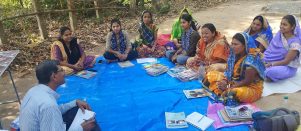Educating Communities
Students from the underprivileged areas mostly face a disenabling learning environment and improper guidance; and get little support from their family and the friend circle. So, in this process, the communities are taken through a visioning process to realize that education can bring them out of Socio-economic deprivation in one generation, and this is one of the suitable routes if they did not want their children to suffer the way they did. It also focused on having a realization that they are expected to take active responsibility for the education of their children than just wishing government alone takes all responsibilities. Having a conducive learning environment at home and community level is equally important as a good school to aid learning of any child. Hence, to begin with, the community is motivated to take responsibility to create right space and environment at the Home and Community level before working on to make it happen at the School level.
Selection of SAATHIS
The candidates nominated by the Mothers Group are invited to a 3 days selection camp, where they are exposed to the real values and vision of a high-quality education system by being engaged in active discussion and brainstorming sessions. Each candidate to be a potential SAATHI is evaluated on the several critical parameters e.g.; empathy, communication skills, emotional maturity, connection with children, interest and ability for action learning, basic subject competency. After the workshop, the merit wise list of Saathis is conveyed to the Mothers’ Group for final appointment.
Training of SAATHIS
The Saathis are trained on the following aspects
- Understanding Self , Socio-economic environment, purpose of life and make career plan
- Understanding the Ecosystem of School Education form one’s own perspective (Identify the elements, understand their linkages and assess their performance)
- Creation of Learning Environment: In Village level Learning Centre, School, Village and GP
- Content Specific Knowledge, assessment, feedback: (Subjects taught in the School; Life Skills – Health and Hygiene, Respecting diversity, Owning Social Responsibility, Ecological sensitivity; Assessment and feedback)
- Learning Methodology: Peer learning, Activity based learning, Problem solving, Near to Far and Learning Involving Hand, Heart and Head

